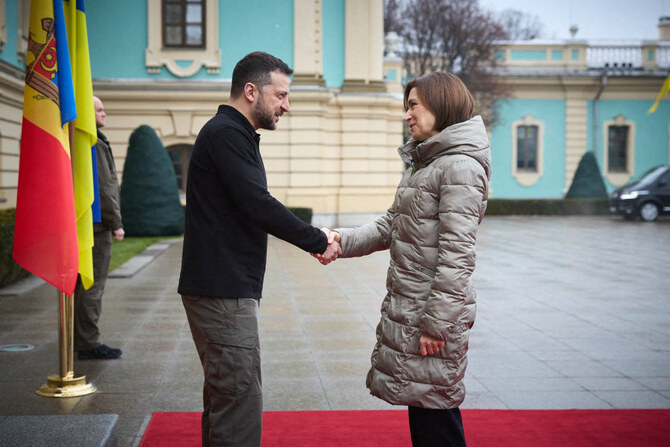KYIV: Ukrainian President Volodymyr Zelensky said Saturday the US has not stopped military aid to Ukraine after newly sworn in US Secretary of State Marco Rubio announced he would pause foreign aid grants for 90 days.
Zelensky did not clarify whether humanitarian aid had been paused. Ukraine relies on the US for 40 percent of its military needs. “I am focused on military aid; it has not been stopped, thank God,” he said at a press conference with Moldovan President Maia Sandu.
The two leaders met in Kyiv on Saturday to discuss the energy needs of Moldova’s Russian-occupied Transnistria region, which saw its natural gas supplies halted on Jan. 1 due to Ukraine’s decision to stop Russian gas transit. Ukraine has said it can offer coal to the Transnistrian authorities to make up for the shortfall.
The future of US aid to Ukraine remains uncertain as President Donald Trump begins his second term in office. The American leader has repeatedly said he wouldn’t have allowed Russia’s invasion of Ukraine to start if he had been in office, although he was president as fighting grew in the east of the country between Kyiv’s forces and separatists aligned with Moscow, ahead of Putin sending in tens of thousands of troops in 2022.
On Thursday, Trump told Fox News that Zelensky should have made a deal with Putin to avoid the conflict. A day earlier, Trump also threatened to impose stiff tariffs and sanctions on Russia if an agreement isn’t reached to end the fighting in Ukraine.
Speaking in Kyiv on Saturday, Zelensky said he had enjoyed “good meetings and conversations with President Trump” and that he believed the US leader would succeed in his desire to end the war.
“This can only be done with Ukraine, and otherwise it simply will not work because Russia does not want to end the war, and Ukraine does,” Zelensky said.
Grinding eastern offensive
With Trump stressing the need to quickly broker a peace deal, both Moscow and Kyiv are seeking battlefield successes to strengthen their negotiating positions ahead of any prospective talks.
For the past year, Russian forces have been waging an intense campaign to punch holes in Ukraine’s defenses in the Donetsk region and weaken Kyiv’s grip on the eastern parts of the country. The sustained and costly offensive has compelled Kyiv to give up a series of towns, villages and hamlets.
Russia’s Defense Ministry claimed Friday that Russian troops had fought their way into the center of the strategically important eastern of Velyka Novosilka, although it was not possible to independently confirm the claim.
Elsewhere, three civilians were killed Saturday in shelling in the Russian-occupied area of Ukraine’s Kherson region, Moscow-installed Gov. Vladimir Saldo said.
He urged the residents of Oleshky, which sits close to the frontline in southern Ukraine, to stay in their homes or in bomb shelters.
Russia also attacked Ukraine with two missiles and 61 Shahed drones overnight Saturday. Ukrainian air defenses shot down both missiles and 46 drones, a statement from the air force said. Another 15 drones failed to reach targets due to Ukrainian countermeasures.
The downed drones caused damage in the Kyiv, Cherkasy and Khmelnytskyi regions, with Ukrainian emergency services saying that five people had to be from a 9-story apartment block in the Ukrainian capital.
Russia also struck Ukraine’s eastern Kharkiv region with drones causing casualties and damage, local authorities said Saturday.
Drones targeted the city’s Shevchenkivskyi, Kyivskyi and Kholodnohirskyi districts, said Mayor Ihor Terekhov.
Russia used a Molniya drone – an inexpensive weapon that has been developed and recently deployed by Russia – in the Shevchenkivskyi district, sparking a fire. The attacks disrupted the city’s water and electricity supplies, the mayor said.
Terekhov said the number of victims was still being determined, while Kharkiv’s governor, Oleh Syniehubov, said three people, two women and a man, were injured in the strikes.



























